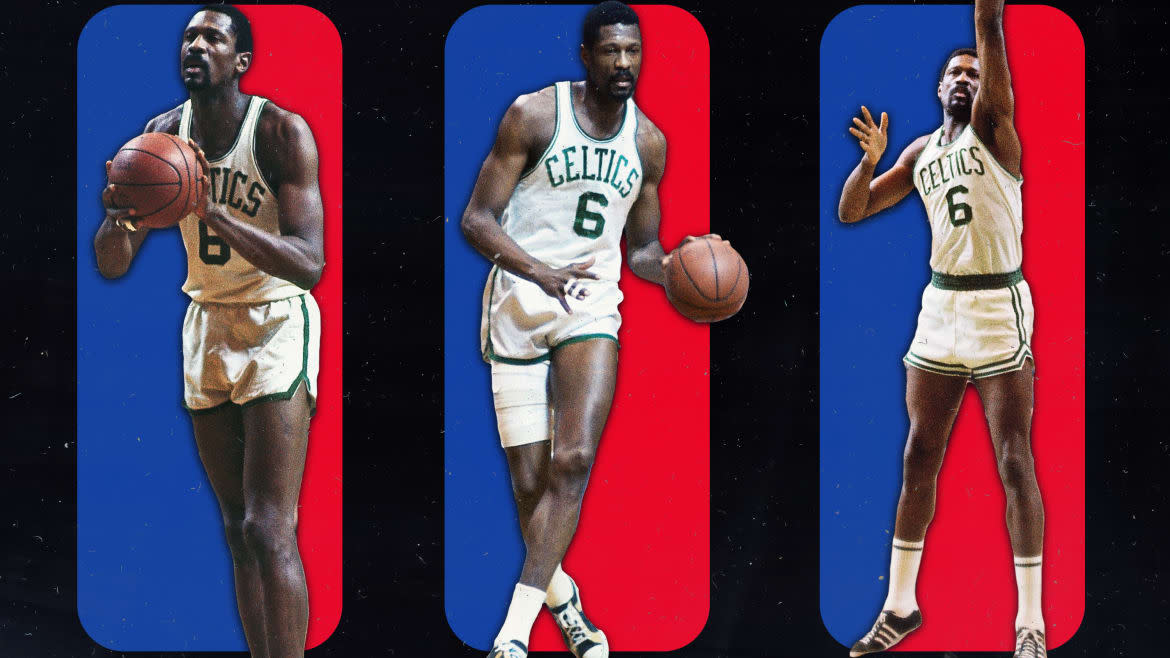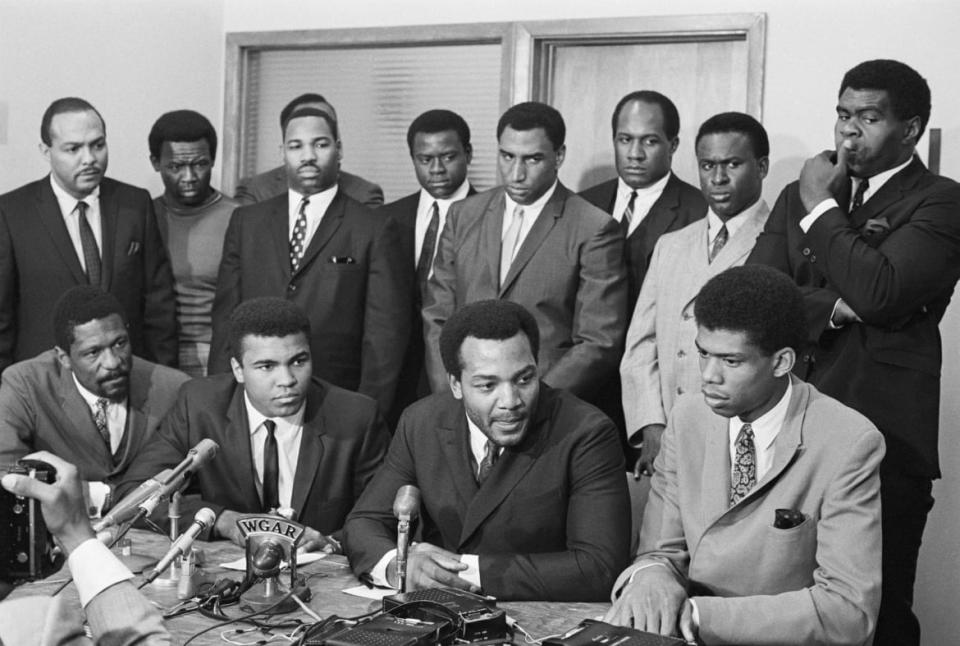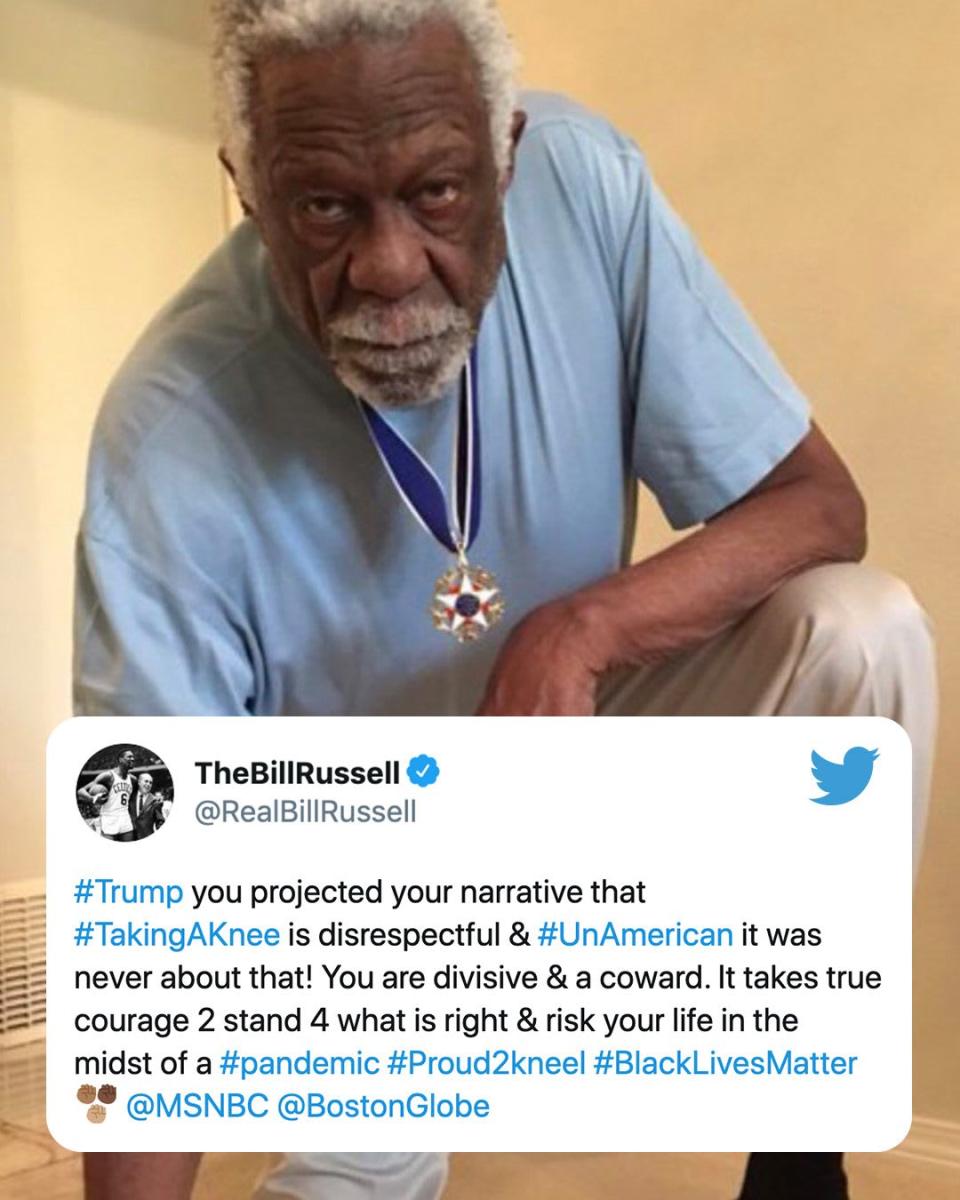Why It’s Time for Bill Russell to Replace Jerry West as the NBA Logo

This weekend, NBA legend Bill Russell’s family announced that Bill had passed on at the age of 88. Russell won 11 titles in 13 seasons as an NBA player, two as the first Black coach in major American professional sports, five league MVPs, two NCAA titles at the University of San Francisco, a program that did nothing before and has done nothing since, two NCAA Tournament Most Outstanding Player awards, and an Olympic gold medal.
Russell managed all this without being a particularly good offensive player. He was a prolific dunker and screen-setter, and a decent foul-shooter, but he brought it hard and cold on the defensive end. He devoured every shot that came into the paint, grabbed rebounds at an obscene percentage—he remains the league’s second all-time leading rebounder, behind lifelong frenemy Wilt Chamberlain—and just blew up the offensive machinations of opponents, who stood dumbstruck and beaten in the face of his iron will. Russell was so obsessed with winning that he would vomit before every game out of sheer nerves.
Calling Russell one of the greatest basketball players who ever lived feels, somehow, like you’re selling him short. There are a handful of players whose physical and tactical mindset warped the way the game was played forever. George Mikan, in the ’50s, invented offensive big man play as we know it. Michael Jordan was the first complete-game ultra-athletic freak. Steph Curry has distorted the size of the court, redefining “shot value.”
Russell out-innovated all of them. Playing the game at center, standing 6-foot-10 but sporting an insane 7-foot-4 wingspan, he basically created basketball defense as we know it: protect the paint at all costs, blow up plays with your feet and your hands, make the other team do something truly extraordinary to beat you possession after possession. Without Russell and his descendants patrolling the paint, there would be no need to create a skyhook, a Eurostep, a baseline fadeaway. You wouldn’t need massive, multiphasic athletes to hit the rim at a million miles an hour if there wasn’t a cunning brick wall waiting for you there. Every solution that offenses have engineered over the years has been, in a way, an attempt at subverting the presence of Bill Russell.

The nation's top Black athletes gathered for a meeting to hear Muhammad Ali's view for rejecting Army induction, including Bill Russell, Boston Celtics; Muhammad Ali; Jim Brown and Kareem Abdul-Jabbar. Back row (left to right): Carl Stokes, Democratic State Rep.; Walter Beach, Cleveland Browns; Bobby Mitchell, Washington Redskins; Sid Williams, Cleveland Browns; Curtis McClinton, Kansas City Chiefs; Willie Davis, Green Bay Packers; Jim Shorter, former Brown and John Wooten, Cleveland Browns.
Russell was also an activist and a crusader for civil rights, at a time when that was far more dangerous than it is now. He led a Celtics boycott against racial segregation in 1961, attended the March on Washington, stood with Ali when he was blackballed after resisting the draft, and ran integrated basketball camps in the Deep South. Heck, here he is as an eightysomething-year-old man, kneeling in deference to the silent protest against police brutality that effectively ended Colin Kaepernick’s NFL career.

And then there’s Boston. Bill Russell is the greatest athlete in the history of Boston sports by a country mile, and yet, there were few men more reviled by the city’s notoriously racist underbelly during the time he plied his trade there. He spoke out in favor of school integration in Boston, the imperial capital of anti-bussing violence. People would trash his house and spray-paint racial slurs on its walls. He didn’t give autographs, because, I mean, why should he, and this was a pretense for every vile sentiment you can possibly imagine—including from the FBI, whose file on Russell called him “An Arrogant Negro Who Refuses To Sign Autographs For White Kids.”
White perspectives on the civil rights movement often emphasize “quiet dignity,” suffering in silence, all that crap. Bill Russell did not do this. When his number was retired by the Celtics organization, he insisted that the ceremony be performed in an empty arena so that he wouldn’t have to share his big moment with the hooting masses of a city that treated him and his family like second-class citizens. In Second Wind: The Memoirs of an Opinionated Man, his excellent (and out-of-print, for some reason) 1979 autobiography, he unloaded on the city: “Boston itself was a flea market of racism,’’ he wrote. “It had all varieties, old and new, and in their most virulent form. The city had corrupt, city hall-crony racists, brick-throwing, send-’em-back-to-Africa racists, and in the university areas phony radical-chic racists…Other than that, I liked the city.” Russell was constitutionally incapable of taking anyone’s shit. A great man of history, in other words.
A few years ago, the NBA named the league’s Finals MVP award after Russell. Russell doesn’t have any trophies himself because, the year he won his last title, 1969, was his final year in the NBA, and the team opted to give the trophy to… Jerry West, who played for the losing team. That same year, the league chose to feature West on their logo, front and center in the league’s branding even though, well, Bill Russell had spent the last decade kicking West’s ass in the Finals, year after year after year. Over the course of Russell’s 13-year-long career, Russell beat West in the NBA Finals a whopping six times, in more and more hilarious and convoluted ways. The year West got his pity Finals MVP, the Laker acquired the services of Wilt Chamberlain, the best player on one of the two teams to ever beat Russell in a playoff series, and he still lost.
In West by West: My Charmed, Tormented Life, West’s far less essential autobiography, Jerry goes on and on about the personal anguish and suffering that he experienced on account of these losses. He also, unintentionally, paints a portrait of himself as a guy who floated through the ’60s doing whatever anyone told him to do, out of pure deference to authority. He claims that he admired Bill Bradley for not taking advertising opportunities that were not offered to his Black teammates, but he kept doing swimsuit ads anyway. He talks about admiring Barack Obama, despite having never given him a red cent while liberally donating to George W. Bush.
You know they called this guy “Mr. Clutch,” even though he got beat in the Finals on seven separate occasions before netting his single NBA title as a player? After his career full of failure and despair, he went straight into the Lakers’ front office, where he whined and whined about everyone being mean to him while every sportswriter in America went out of their way to declare him a genius. Those same opportunities were out of reach for Russell, the first Black coach in NBA history and the first Black coach to win an NBA title, because Russell was not a sniveling, deferential white dude who kissed the ring of authority every morning and cried about it every night.
In 2011, President Obama gave Russell the Medal of Freedom, the nation’s highest civilian honor, for his barrier-breaking career and his lifetime devoted to the cause of civil rights for all. Well-deserved, I’d say. Then, time passed. In 2016, you might recall, Donald Trump, a reality TV star, real estate grifter and accused serial sexual predator, was elected president for reasons that seem obscure even to this day. During his campaign, Trump was monumentally racist—and as a result of this, NBA teams largely populated by the sort of Black men Russell fought for 50 years prior, opted out of appearing at the White House after winning the NBA title, as was standard practice for decades. This was the sort of slight that annoyed Trump, a strange little man obsessed with celebrity. In 2019, Trump sought to soothe his bruised ego by giving the Medal of Freedom to Jerry West, whose accomplishments outside of basketball are mostly golf club buffet-related. Now, West could have been a decent person and said, no thank you, the Black men who built the league where I made my living seem to regard doing photo ops with you as beneath their dignity, and I will respect their position as a fellow member of the NBA community. And yet!
Jerry West is on the logo because he is the sort of guy that the NBA wants to symbolize their product: a guy who shuts the hell up and takes his checks, entertained the fans without complications, does whatever rich guys tell him to, and takes every iota of aggression he has and directs it entirely at himself instead of at the systems that pulverize and destroy the world. Jerry might have been a loser, but he was their loser—an easy, uncomplicated star who did what he was told and printed money for the product. The time has come to recognize that this is not good enough for the league or for the world it helped create. The NBA should honor Russell, placing him right where he belongs in the history of the game: in the middle, going for one of his 21,620 career rebounds, between a stripe of red and blue.
Get the Daily Beast's biggest scoops and scandals delivered right to your inbox. Sign up now.
Stay informed and gain unlimited access to the Daily Beast's unmatched reporting. Subscribe now.

